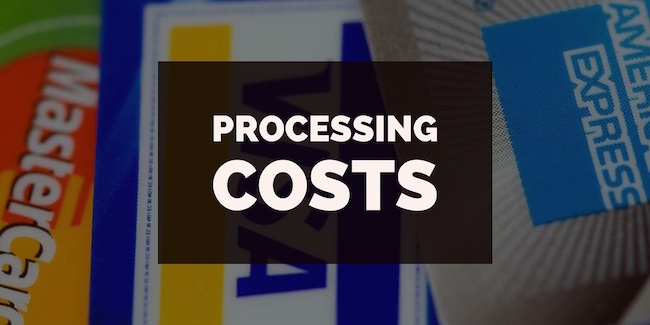If your small business accepts credit cards, you’re no doubt aware of credit card processing costs. Since everyone wants to pay in with plastic rather than cash, refusing to be paid in credit cards isn’t the best option. Instead, get a handle on what credit card processing fees you’re likely to be charged; and how you can eliminate as many of them as possible.
There are essentially three types of fees. These include transactional fees, situational fees, and fixed fees, and each of them is a little bit different.
However, with each fee, you’ll be paying a base fee which doesn’t vary from one merchant service to another. You’ll also have a markup fee, which is how your credit card processor can make a profit from your business.
Transactional Fees
Transactional fees are, by far, the biggest cost to you from your credit card processor. They include reimbursement fees and assessments, which are the fees that the credit card companies or banks charge. These assessments are based on the total transaction volume, or, how much your sales were for a given month. If you’re on an interchange-plus pricing structure, each fee will be stated as a wholesale rate followed by the markup.
This makes it easy for you to see what you’re actually paying to be paid, as they say. However, if you’re using a service with a tiered pricing plan–you may see designations like Qualified, Mid-Qualified, and Non-Qualified–then you won’t know what you’re actually paying in markup transactional fees, because you’ll be quoted a total rate instead of one that reveals the margin your processor is making. Obviously, this is a disadvantage for you as a business owner.
Situational (or Incidental) Fees
The dreaded chargeback fee falls into this category; so do many other frustrating fees that come along when something goes wrong. If you don’t have enough funds in your account to cover expenses, you may be charged an NSF fee. Let’s say your customer disputes a charge from your business. Whether or not it actually goes through, you’ll be charged a retrieval request fee.
If it does go through, you’ll get that unfortunate chargeback fee (on top of losing the money from the sale). It’s not all bad, though; some of the fees here may apply when you submit a batch (just a dime or two a day) or when you call to verify certain information before a transaction is authorized. The one fee here that e-commerce businesses need to look for is the AVS or address verification service fee. AVS will be charged on every single one of your transactions.
Fixed (or Flat) Fees
Many of the fees on your credit card processing statement fall into this category, and they can be the most confusing of all (not that they need to be). Let’s look at a few of the most common ones that you don’t need to be paying. First of all, you may have a terminal leasing fee; this is a bad deal because simply buying a terminal once will save you a whole lot of money in the long run. This is definitely one fee you should get rid of immediately. Second, you may see an “annual fee.” This is just a nonsense fee, completely arbitrary, and definitely not something that you need to be paying for. Third, payment gateway fees are similar to terminal fees, but they’re applied to e-commerce businesses.
If you’re paying this fee, you need to be aware that there are many processing companies that offer this free of charge. Fourth, monthly minimum fees are charged by providers who want your money if you’re not hitting a certain target sales goal each month. The best credit card processors won’t take your money for not making a lot, so consider ditching your current processor if you’ve been seeing this fee.















